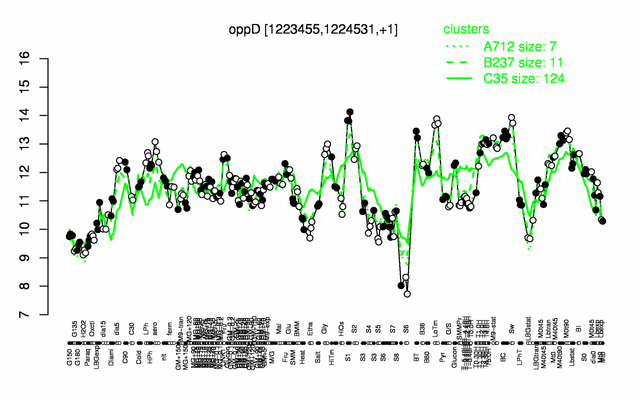OppD
- Description: oligopeptide ABC transporter (ATP-binding protein)
| Gene name | oppD |
| Synonyms | spo0KD |
| Essential | no |
| Product | oligopeptide ABC transporter (ATP-binding protein) |
| Function | initiation of sporulation, competence development |
| Gene expression levels in SubtiExpress: oppD | |
| Interactions involving this protein in SubtInteract: OppD | |
| Metabolic function and regulation of this protein in SubtiPathways: oppD | |
| MW, pI | 39 kDa, 6.028 |
| Gene length, protein length | 1074 bp, 358 aa |
| Immediate neighbours | oppC, oppF |
| Sequences | Protein DNA DNA_with_flanks |
Genetic context 
This image was kindly provided by SubtiList
| |
Expression at a glance PubMed
| |
Contents
Categories containing this gene/protein
ABC transporters, utilization of nitrogen sources other than amino acids, genetic competence, phosphorelay, membrane proteins
This gene is a member of the following regulons
The gene
Basic information
- Locus tag: BSU11460
Phenotypes of a mutant
Database entries
- BsubCyc: BSU11460
- DBTBS entry: no entry
- SubtiList entry: [1]
Additional information
The protein
Basic information/ Evolution
- Catalyzed reaction/ biological activity:
- Protein family: ABC transporter domain (according to Swiss-Prot)
- Paralogous protein(s):
Extended information on the protein
- Kinetic information:
- Domains:
- Modification:
- Cofactor(s):
- Effectors of protein activity:
- Localization: attached to the cell membrane (via OppB-OppC) PubMed
Database entries
- BsubCyc: BSU11460
- Structure:
- UniProt: P24136
- KEGG entry: [2]
- E.C. number:
Additional information
Expression and regulation
- Sigma factor:
- Regulation:
- Additional information:
- number of protein molecules per cell (minimal medium with glucose and ammonium): 138 PubMed
- number of protein molecules per cell (complex medium with amino acids, without glucose): 1235 PubMed
- number of protein molecules per cell (minimal medium with glucose and ammonium, exponential phase): 40 PubMed
- number of protein molecules per cell (minimal medium with glucose and ammonium, early stationary phase after glucose exhaustion): 148 PubMed
- number of protein molecules per cell (minimal medium with glucose and ammonium, late stationary phase after glucose exhaustion): 68 PubMed
Biological materials
- Mutant:
- Expression vector:
- lacZ fusion:
- GFP fusion:
- two-hybrid system:
- Antibody:
Labs working on this gene/protein
Your additional remarks
References
Nicolas Mirouze, Vijay Parashar, Melinda D Baker, David A Dubnau, Matthew B Neiditch
An atypical Phr peptide regulates the developmental switch protein RapH.
J Bacteriol: 2011, 193(22);6197-206
[PubMed:21908671]
[WorldCat.org]
[DOI]
(I p)
Ken-ichi Yoshida, Hirotake Yamaguchi, Masaki Kinehara, Yo-hei Ohki, Yoshiko Nakaura, Yasutaro Fujita
Identification of additional TnrA-regulated genes of Bacillus subtilis associated with a TnrA box.
Mol Microbiol: 2003, 49(1);157-65
[PubMed:12823818]
[WorldCat.org]
[DOI]
(P p)
A Koide, M Perego, J A Hoch
ScoC regulates peptide transport and sporulation initiation in Bacillus subtilis.
J Bacteriol: 1999, 181(13);4114-7
[PubMed:10383984]
[WorldCat.org]
[DOI]
(P p)
Y Quentin, G Fichant, F Denizot
Inventory, assembly and analysis of Bacillus subtilis ABC transport systems.
J Mol Biol: 1999, 287(3);467-84
[PubMed:10092453]
[WorldCat.org]
[DOI]
(P p)
J R LeDeaux, J M Solomon, A D Grossman
Analysis of non-polar deletion mutations in the genes of the spo0K (opp) operon of Bacillus subtilis.
FEMS Microbiol Lett: 1997, 153(1);63-9
[PubMed:9252573]
[WorldCat.org]
[DOI]
(P p)
A Koide, J A Hoch
Identification of a second oligopeptide transport system in Bacillus subtilis and determination of its role in sporulation.
Mol Microbiol: 1994, 13(3);417-26
[PubMed:7997159]
[WorldCat.org]
[DOI]
(P p)
D Z Rudner, J R LeDeaux, K Ireton, A D Grossman
The spo0K locus of Bacillus subtilis is homologous to the oligopeptide permease locus and is required for sporulation and competence.
J Bacteriol: 1991, 173(4);1388-98
[PubMed:1899858]
[WorldCat.org]
[DOI]
(P p)
M Perego, C F Higgins, S R Pearce, M P Gallagher, J A Hoch
The oligopeptide transport system of Bacillus subtilis plays a role in the initiation of sporulation.
Mol Microbiol: 1991, 5(1);173-85
[PubMed:1901616]
[WorldCat.org]
[DOI]
(P p)